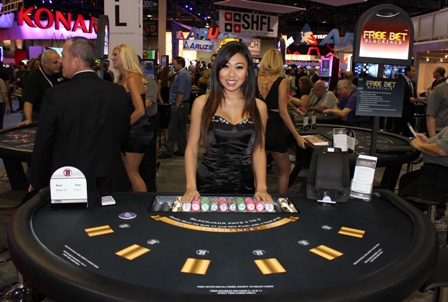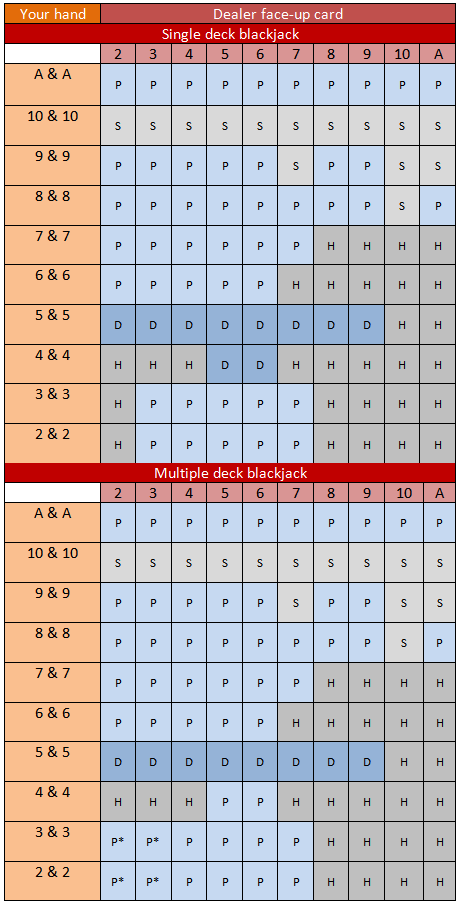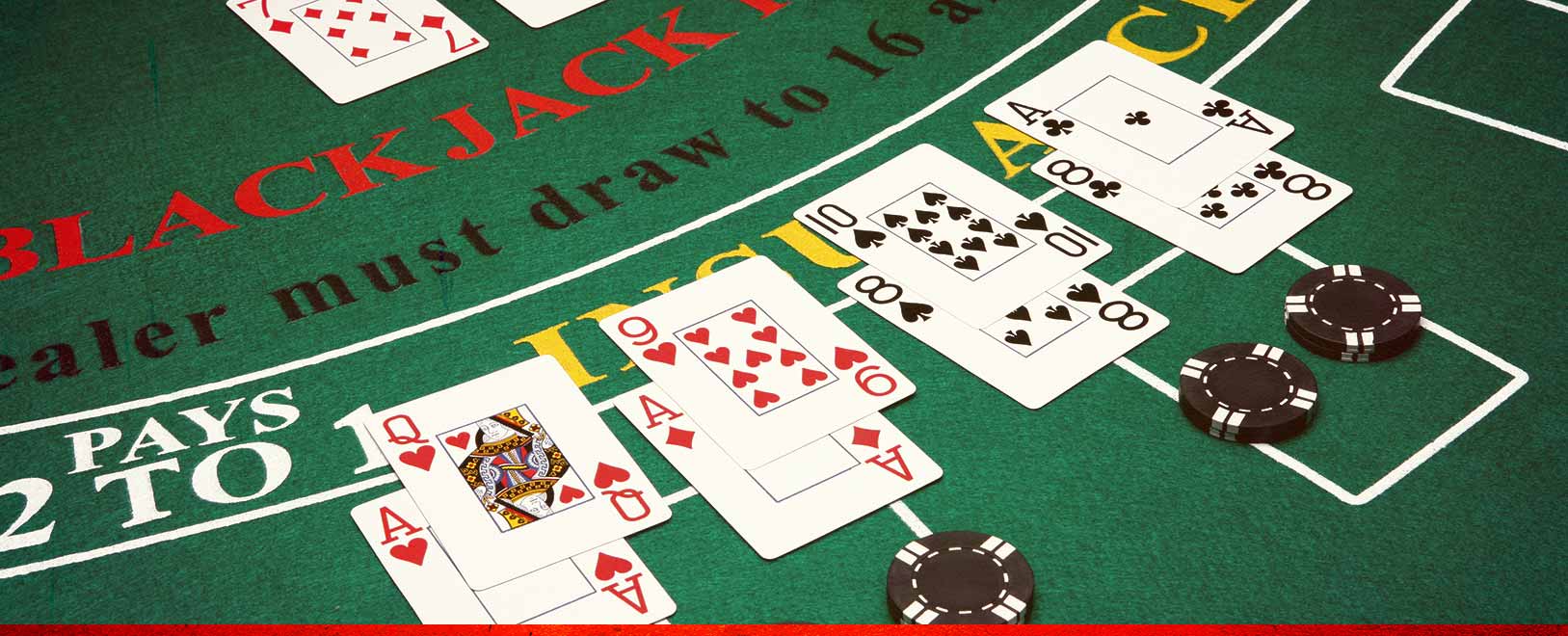Blackjack Pairs Strategy
If playback doesn't begin shortly, try restarting your device. Autoplay is paused. You're signed out. Videos you watch may be added to the TV's watch. The basic strategy for pair splitting is shown below in a black and white table followed by a color-coded chart for single-, double-, and 4/6/8-deck games. The black and white strategy table shows your pair in the first column and, in the second column, what the dealer’s upcard should be for you to split.
US Players and Credit Card, BitCoin Deposits Accepted!
How to Play a Pair of 4's in Blackjack
Soft hands:Soft 13 - 14 - Soft 15 - 16 - Soft 17 - Soft 18 - Soft 19 to 21
Splitting pairs:Aces - 2's - 3's - 4's - 5's - 6's - 7's - 8's - 9's - 10's
Should You Split Fours?
Almost never. The only time you'll split 4's is when the dealer upcard is a 5 or a 6.
Reasoning
A pair of 4's is a hard total of 8, which gives you a good chance of catching an 18 for your finishing total, which is a reasonable hand.
If the dealer has a 5 or a 6, she has a great chance of busting. You're hoping to catch a couple of totals of 14 when you split, which will win if the dealer busts.
US Players and Credit Card, BitCoin Deposits Accepted!
Table game purists love blackjack because of its simplicity and clockwork nature.
.jpg)
You start with two cards, as does the dealer, and by hitting, standing, doubling down, or splitting along the way, the goal always remains the same – reach a total of 21, or close to it, without going over. By applying the tenets of blackjack gambling strategy – which offers strict guidelines on how to play every possible player total vs. dealer up card scenario – skilled blackjack players can shave the house edge down to under 0.50 percent.
That makes blackjack in its most basic form one of the most favorable games spread on any casino floor. Thus, it’s no surprise to see blackjack reign supreme as the most popular table game offered by Las Vegas casinos for the last 50 years and counting.
Along the way, however, clever casino executives and gambling game designers have managed to do the seemingly impossible – improve on blackjack’s fundamental structure. Recognizing that modern gamblers like to have several irons on the fire, so to speak, these innovators have successfully integrated a slew of optional side bets alongside blackjack’s base gameplay.

Blackjack side bets come in all variety of formats, but the all share one thing in common – flexibility.
To celebrate the exciting world of blackjack side bets, I’ve taken to this blog to pen a series on several of the most popular options available in Sin City. You can learn about classics like the “21 + 3” side bet, the iconic “Lucky Ladies”, and its close cousin “Lucky Lucky” by visiting those pages for further insight.
And when you’re done there, bring it back to this page to brush up on one of the more interesting blackjack side bets ever devised – the “Perfect Pairs.”
Introduction to the Perfect Pairs Side Bet
The year was 1999 and Australian blackjack dealer John Wicks found himself growing a bit bored with the basic gameplay at his table.
To keep himself focused on the task at hand, Wicks began mentally tracking various patterns in the randomized deal of his multiple-deck shoe. Eventually, after noticing that players occasionally received paired holdings as their starting hand, Wicks began brainstorming the next big thing in blackjack.
Wicks realized that the eight-deck shoes which are standard in Australian casinos were capable of producing three different versions of a paired player hand.
First off, the player can look down to see a pair of any card rank in differing colors, such as the 7 of hearts and the 7 of spades. Next up were the so-called “colored” pairs, made up of two identical card ranks using the same colored suits (7 of spades + 7 of clubs; or 7 of hearts + 7 of diamonds). And finally, in the rarest combination, the eight-deck shoe could even dispense two identical cards like the 7 of spades + 7 of spades to form a “Perfect Pair.”
Wicks began letting his players know when they received these curious combinations, and inevitably, gamblers became intrigued by a random shuffle’s uncanny ability to make magic happen on the felt. As his players began celebrating the arrival of Perfect Pair combos, the proverbial lightbulb went off above Wicks’ head.
After tinkering with the idea for a while during his spare time – working out the probabilities and devising appropriate payouts – Wicks eventually secured patent protection for his new Perfect Pairs side bet. He convinced his home casino to give the experiment a trial run, and when players provided rave reviews, casino game manufacturing giant TCS John Huxley came calling with an acquisition offer.
Here’s how TCS John Huxley describes the Perfect Pairs side bet to potential casino operator customers:
“Perfect Pairs is both fast and easy to play. It has great player appeal and significantly boosts game turnover without affecting playing strategy. It has been proven to increase both cash drop and win/hold percentages and is extremely popular with players. It is a great enhancement to any Blackjack game.”
Today, the Perfect Pairs side bet is a mainstay in the Australian and Asian blackjack market, but you can also find several casinos in Las Vegas spreading the popular option.
How to Land a Winner on the Perfect Pairs Side Bet
I already went over the three qualifying hands that can trigger a Perfect Pairs side bet payout, but you can review those in the table below:

Perfect Pairs Side Bet Qualifying Hands
| HAND | DESCRIPTION |
|---|---|
| Perfect Pair | Any 2 cards of identical rank AND suit (7 of spades + 7 of spades) |
| Colored Pair | Any 2 cards of identical rank AND color (6 of spades + 6 of clubs) |
| Red + Black Pair | Any 2 cards of identical rank but different colors (5 of clubs + 5 of hearts) |
The best part about the Perfect Pairs side bet is that you don’t need specific cards to match up in order to win. Landing a lowly pair of deuces (2s), a pretty pair of Kings, or even an Ace-Ace combo will do the trick.
Now then, on to the good stuff… the sweet payouts awarded when you make a Perfect Pairs side bet winner. As you can see below, Wicks designed his Perfect Pairs side bet to be flexible based on each casino’s preferred payout settings:
Perfect Pair Side Bet Payouts
| HAND | PAY TABLE #1 | #2 | #3 | #4 |
|---|---|---|---|---|
| Perfect Pair | 25 to 1 | 30 to 1 | 25 to 1 | 25 to 1 |
| Colored Pair | 12 to 1 | 10 to 1 | 12 to 1 | 15 to 1 |
| Red + Black Pair | 6 to 1 | 5 to 1 | 5 to 1 | 5 to 1 |
Pay table # 1 above is considered to be the standard for Perfect Pairs side betting, but you’ll run into the other three alternatives from time to time.
Blackjack side bets generally require players to wager at least the posted table minimum for the base game, which tends to be $5 in most Sin City table game pits. That means landing a true Perfect Pair can turn a minimum bet into $125 using pay table # 1, or $150 on pay table # 2.
Probabilities and House Edge Rates for the Perfect Pairs Side Bet
When using an eight-deck shoe in blackjack, players obviously have eight of each unique card to work with when trying to land paired starting hands. That is to say, the shoe contains eight different 2 of spades, 3 of hearts, 4 of clubs, and so on up the ladder.
Blackjack Pairs Strategy Rules
But as the data presented below makes clear, drawing two of the exact same card (rank and suit) is quite rare indeed:
Perfect Pairs Side Bet Combos, Probabilities, and Expected Return Rates
| HAND | COMBOS | PROBABILITY | EXPECTED RETURN |
|---|---|---|---|
| Perfect Pair | 1,456 | 1.69 percent | 0.421687 |
| Colored Pair | 1,664 | 1.93 percent | 0.231325 |
| Red + Black Pair | 3,328 | 3.85 percent | 0.231325 |
| Non-Pair | 79,872 | 92.53 percent | -0.040964 |
| Total | 86,320 | 1.00 | -0.040964 |
As you can see, the probability of landing a true Perfect Pair using an eight-deck shoe stands at just 1.69 percent.
And while you might suspect the odds would double in the player’s favor when it comes to colored pairs, the probability only rises slightly to 1.93 percent. You’ll have a better chance of landing a Red + Black pair at 3.85 percent, but all told, your combined win probability when wagering on the Perfect Pairs side bet is only 7.47 percent.

That means more than 9 out of 10 deals will produce no paired starting hand to speak of, causing your Perfect Pairs side bet to be collected by the house.
However, despite this low win rate, the Perfect Pairs side bet (when using pay table # 1) offers players a relatively favorable house edge rate of 4.09 percent.
That’s well within acceptable parameters for a table game side bet, and even a full-fledged casino game based on chance alone. To wit, double-zero roulette wheels provide the house with an inherent edge of 5.26 percent on every wager placed.
On a final not about house edge rates for the Perfect Pairs side bet, be sure to examine the pay table in use carefully before placing any wagers. When casinos opt for any of the three alternative pay tables, the house edge can fluctuate wildly as a result:

Perfect Pairs Side Bet House Edge Rates (by Pay Table)
| PAY TABLE | HOUSE EDGE |
|---|---|
| #1 | 4.09 percent |
| #2 | 3.37 percent |
| #3 | 7.95 percent |
| #4 | 2.17 percent |
That’s right, the standard pay table used on Perfect Pairs side betting action is actually the third-worst out of four options from the player’s perspective.
You should avoid pay table # 3 like the plague given its 7.95 percent house edge, but pay tables #2 (3.37 percent) and #4 (2.17 percent) provide a better chance of success over the long run.
Traps to Watch Out for When Playing the Perfect Pairs Side Bet
Other than the extremely high house edge rate incurred by playing Perfect Pairs against pay table # 3, the main trap used by casinos to prey on unsuspecting players concerns deck construction.
Blackjack Perfect Pairs Strategy
It doesn’t take a genius to realize that a side bet like Perfect Pairs becomes easier to win when more decks are in the shoe. More decks equals more cards of the same rank to work with, making the possibility of finding a pair on the deal much more likely.
Conversely, when the casino opts for smaller shoes containing fewer than eight decks, the player loses valuable variety in terms pairable cards. Check out the table below to see just how drastically fewer decks in the shoe affects your house edge on the Perfect Pairs side bet:
Perfect Pairs Side Bet House Edge Rates (by Pay Table and Number of Decks)
| DECKS | PAY TABLE #1 | #2 | #3 | #4 |
|---|---|---|---|---|
| 2 | 22.33 percent | 25.24 percent | 26.21 percent | 20.39 percent |
| 4 | 10.14 percent | 10.63 percent | 14.01 percent | 8.21 percent |
| 5 | 7.72 percent | 7.72 percent | 11.58 percent | 5.79 percent |
| 6 | 6.11 percent | 5.79 percent | 9.97 percent | 4.18 percent |
| 8 | 4.09 percent | 3.37 percent | 7.95 percent | 2.17 percent |
Any casino willing to commit highway robbery by using the Perfect Pairs side bet on anything other than an eight-deck shoe doesn’t deserve your business gambling real money on blackjack.
Whenever house edge rates rise above 5 percent, let alone the double-digits, sharp gamblers know instinctively to stay away and preserve their bankroll for better bets.
Conclusion
The Perfect Pairs side bet may not be perfect – what with only three qualifying winning hand types and relatively low payouts up top – but it’s still a fun way to spice up blackjack’s base game. Landing certain pairs like the 6-6, 7-7, or 8-8 can lead to extremely tricky situations for basic strategy players, and usually, these tough totals will result in a base game loser. But when you have the Perfect Pairs side bet in play, finding one of these difficult pairs becomes a blessing in disguise thanks to the supplementary payout subsidizing any potential losses to the dealer.